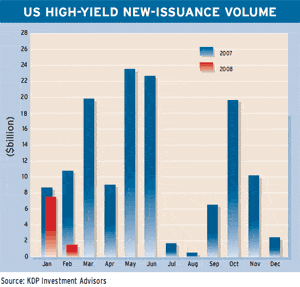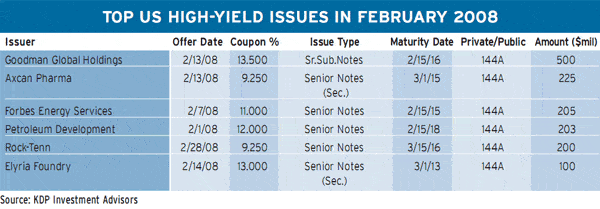Credit spreads widened last month and corporate bond yields were at or above levels that prevailed prior to the start of the Federal Reserve’s monetary easing last summer, leading economists to conclude that the US economy will continue to struggle for months to come.
“Fed officials’ hopes that aggressive easing will provide a bridge to recovery are being frustrated by policy-resistant financial turmoil,” says Robert DiClemente, chief US economist at Citi. “Credit spreads and shuttered supply lines are an especially hostile source of restraint on economic growth,” he says.
The restrictive financial backdrop is aggravating the ongoing housing downturn and likely feeding back on markets, DiClemente says. As home prices continue to decline, this is contributing to the battering of prices for mortgage-related securities, he says. Credit that depends heavily on securitization is especially tight, he adds, and housing-related drags may linger well into the next economic upturn.
“As stress in the prime mortgage market accelerates, the probability of government intervention rises,” says Jeff Meli, head of US credit strategy at Barclays Capital in New York. The impact of severe price declines in prime mortgages is significantly greater than similar drops in subprime loans, given their relative size in the market, increased leverage and potential ramifications on the government-sponsored enterprises, such as Fannie Mae and Freddie Mac, according to Meli.
“We believe there are growing signs that the government may step in to stop conditions from deteriorating further,”
Meli says. “If it proposes a plan to help ease the situation, we would expect spreads to rally, particularly for credits with clean fundamentals that have been dragged wider with the overall market.”

The Federal Reserve last month said it was taking additional action to ease the credit crisis, including increasing the amount of money it planned to auction in March to $100 billion from a previously announced $60 billion. Fed officials said in a statement that they would offer even larger amounts at future auctions if necessary to get banks the cash they need to keep lending.
The Fed began this new type of auction in December 2007.
Meanwhile, the volume of new issuance in the US high-yield bond market slumped in February to $1.4 billion from $7.4 billion in January, according to Montpelier, Vermont-based KDP Investment Advisors. The biggest offering was a $500 million issue of senior subordinated notes by Houston-based Goodman Global Holdings. The manufacturer of heating, ventilation and air-conditioning equipment merged with an affiliate of San Francisco-based private equity firm Hellman & Friedman and refinanced previously existing debt. Goldman Sachs and JPMorgan Securities advised Goodman Global’s board in connection with the merger transaction.

Gordon Platt



